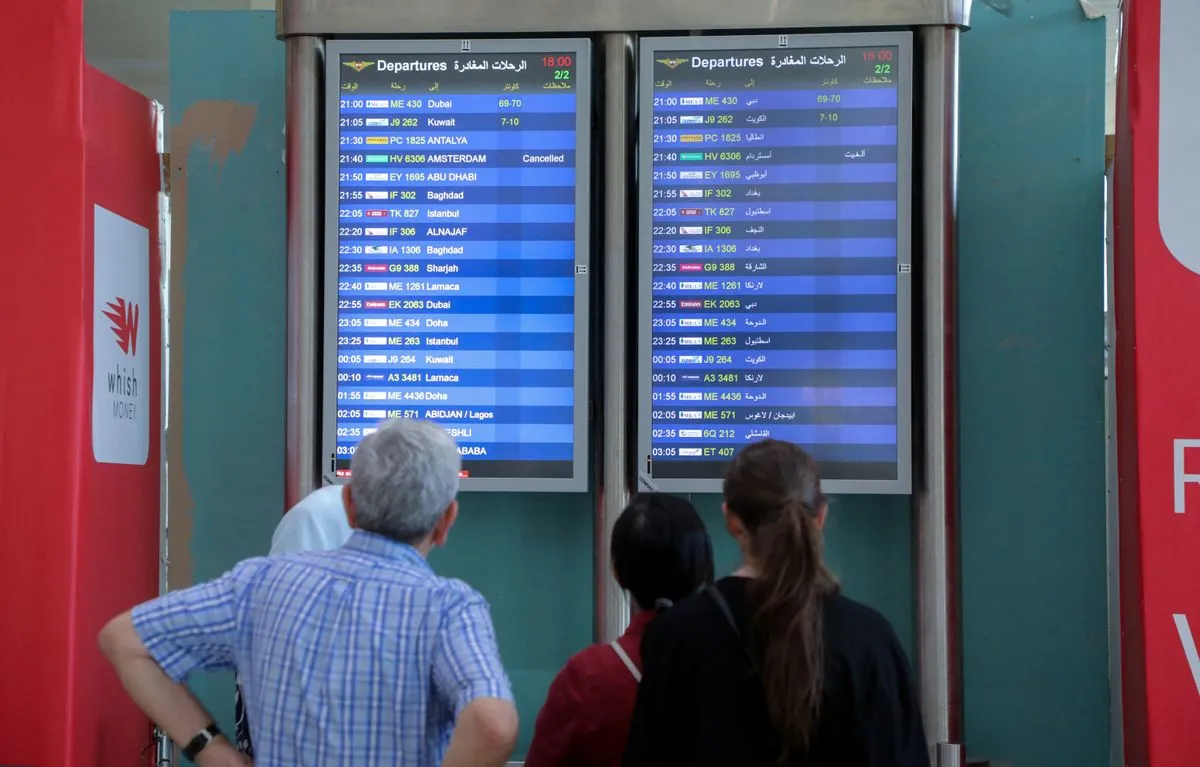Middle East Tensions Spark Air Travel Chaos and Industry Concerns
Rising tensions in the Middle East have led to widespread flight cancellations and diversions. The situation has impacted multiple airports and airlines, raising concerns about the industry's stability.

Recent escalations in Middle Eastern tensions have resulted in significant disruptions to air travel across the region. As of October 2, 2023, numerous global airlines have been forced to divert or cancel flights, causing chaos for travelers and raising concerns within the aviation industry.
FlightRadar24, a global flight tracking service, reported extensive delays and cancellations at several key airports in the region. Dubai International Airport, the world's busiest airport by international passenger traffic, experienced delays for 85% of its departing flights. Meanwhile, Lebanon's Rafic Hariri International Airport in Beirut saw 60% of its flights cancelled, and Kuwait International Airport reported delays for 67% of arriving flights.
The disruptions stem from Iran's recent missile attack on Israel, which was launched in retaliation for Israel's campaign against Iran-backed Hezbollah in Lebanon. This attack prompted Israel to threaten a "painful response," further intensifying the already volatile situation in the region.

As a result of these developments, many airlines have suspended their routes to Israel and Lebanon. British Airways and Air France-KLM have extended their flight cancellations to Tel Aviv's Ben Gurion Airport until at least early October, including the one-year anniversary of Hamas' attack on Israel on October 7, 2023.
The impact of these disruptions extends beyond the immediate region. Air traffic over major hubs such as Istanbul, Cairo, and Antalya remains dense as flights reroute to avoid certain parts of Middle Eastern airspace. This situation highlights the complex challenges faced by air traffic control systems, which rely on radar and satellite technology to manage airspace and ensure safe flight operations.
The ongoing crisis is expected to have significant repercussions for the airline industry, which was already grappling with restrictions due to conflicts between Israel and Hamas, as well as Russia and Ukraine. The global airline industry, valued at approximately $472 billion in 2022, supports around 87.7 million jobs worldwide and plays a crucial role in international trade and tourism.
"The current situation in the Middle East poses significant challenges for the aviation industry. We are closely monitoring the developments and working with our member airlines to ensure the safety of passengers and crew while minimizing disruptions to air travel."
These events have also had a negative impact on travel and airline shares, reflecting investor concerns about the industry's stability. The situation underscores the vulnerability of the aviation sector to geopolitical tensions and conflicts.
As the crisis unfolds, airlines and airports are adapting their operations to ensure passenger safety while minimizing disruptions. However, the long-term implications for the industry remain uncertain, particularly given the ongoing conflicts in the region and their potential to further destabilize air travel.
The aviation industry, which contributes approximately 2% to global carbon emissions, now faces additional challenges in maintaining its operations and meeting environmental goals. Middle Eastern airlines, which have seen significant growth in the past two decades with carriers like Emirates becoming major global players, may be particularly affected by these developments.
As the situation continues to evolve, travelers are advised to stay informed about potential changes to their flight schedules and to remain in contact with their airlines for the latest updates. The international community watches closely, hoping for a resolution that will allow for the normalization of air travel in this critical region.


































